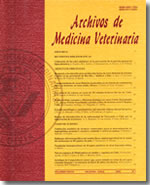The effects of using dried salmon silage in broiler chicken diets on productive performance and meat sensory quality
Main Article Content
Abstract
The aim of this study was to determine the effect of using dried salmon silage in broiler diets on performance parameters and meat sensory quality. Dried salmon silage (ESS) was obtained from salmon wastes, processed by acid digestion and co-dried with wheat bran (70:30, respectively). Three hundred Ross 308 broiler chickens were used, and randomly distributed to five feeding groups: control, C (0% ESS), T1 (4% ESS), T2 (8% ESS), T3 (12% ESS) and T4 (15% ESS). The chicks were fed for 32 days with these diets, and with control diet only from day 33 to day 42. The following performance parameters were quantified: mortality percentage (%M), body weight (PV), daily weight gain (GPV), feed intake (CA), and feed conversion (ECA). After day 42, samples of breast and drumstick meat were obtained for sensory analysis. The diets used were isoproteic and isoenergetic. The use of ESS did not have a significant effect on %M, PV, GPV, CA and ECA (P < 0.05), and neither did it affect the sensory quality of breast and drumstick meat. In conclusion ESS can be used as an important contribution to broiler feed, and an alternative to protein concentrates that are currently in the market. Additionally, the inclusion of ESS up to 15% in broiler diets until day 32 does not generate adverse effects on productive performance, and breast and drumstick meat sensory quality.

